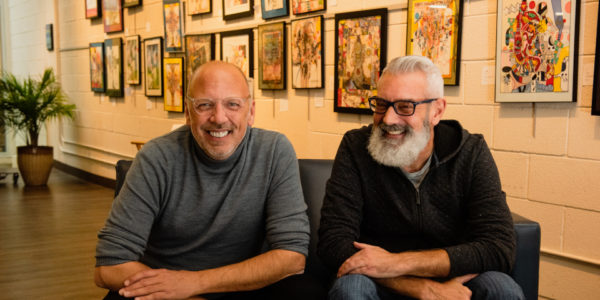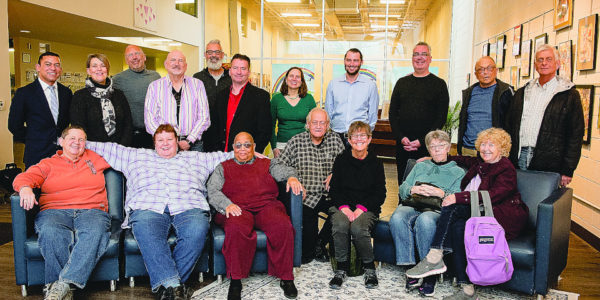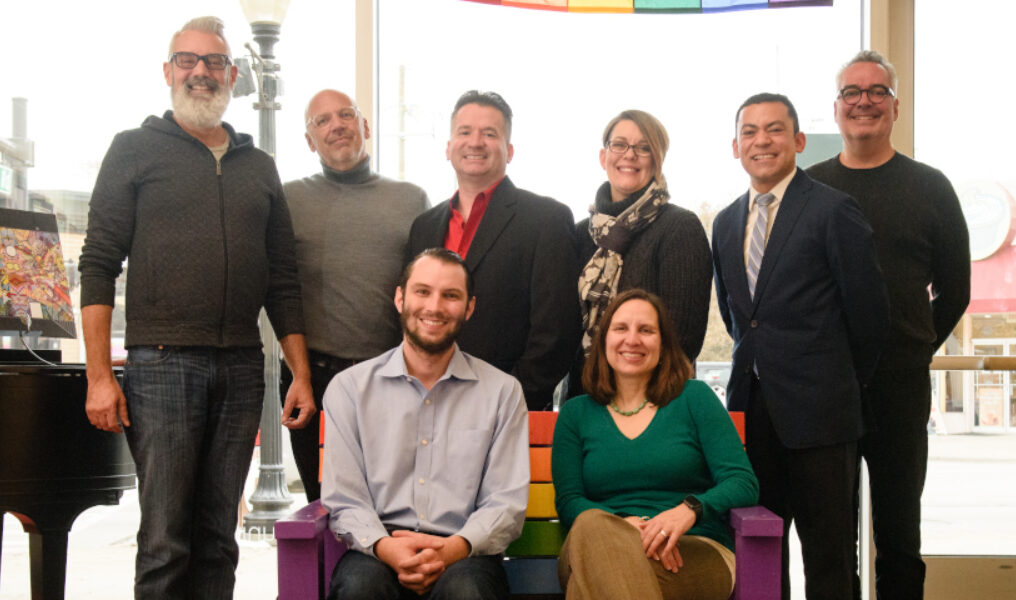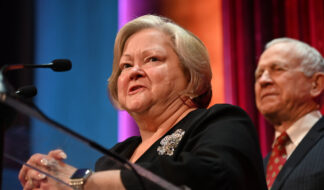At any age, it's true that preventative care is the key to identifying and treating a myriad of diseases and medical conditions early. But when it comes to the LGBTQ community, it's not always as simple as choosing a doctor's office and scheduling an appointment. Other factors, like the likelihood of discrimination, must be taken into account. And history has shown that medical discrimination can happen anywhere, like in 2014 when Michigan moms Jami and Krista Contreras took their six-day-old child in for a checkup only to be denied service on religious grounds.
It was around that time five years ago, when the vision of Corktown Health Center was being conceptualized. The goal was a simple one: providing comprehensive health care to everyone who needs it regardless of their ability to pay and especially for those in the local LGBTQ community. Today, Corktown Health Center has evolved from an idea into a clinic that sees hundreds of patients annually, provides primary care, behavioral health services, cancer screenings and comprehensive HIV care and treatment. The Corktown operating budget for 2018-2019 exceeded $4.6 million. In 2018, when Between The Lines asked Corktown's Chief Development Officer Patrick Yankee about Corktown's projected goals for 2019, he said that expansion was front and center.
"In 2018 we served over 525 people from the LGBTQ community at Corktown Health Center. My hope for 2019 is that we double this number by this time next year with expanded primary care, aging services and improved access to behavioral health and preventative services like PrEP and cancer screening," Yankee said.
Now, because of a partnership with Affirmations, Michigan's largest LGBTQ center, it looks as though that goal will be doubly fulfilled: plans are already in motion for a duplicate clinic to be installed within the Ferndale community center's basement level by fourth quarter in 2020. Here's a snapshot of where the project stands currently.

The two development directors, Patrick Yankee of Corktown and John Joanette of Affirmations. BTL Photo: Andrew Potter
Merging Ideas
Last year, while Corktown was gearing up to expand current services, Affirmations was going through its own drastic restructuring. Because of financial difficulties and a period of upset due to frequently changing leadership, Affirmations was in danger of closing its doors. However, according to Mike Flores, who was Affirmations' interim board president — and later board president — at the time, it was that period of uncertainty that allowed for Affirmations to alter its goals to be more in line with community needs. He described the idea for this partnership as the organic result of many community talks.
"As part of those discussions, Affirmations was looking for different types of partnerships to make sure that one: we were providing relevant services to the community. Number two: strengthening our partnerships with other organizations out there that really do specialize in very, very, much-needed services that Affirmations wasn't necessarily an expert in but knew that it was something that the community needed," Flores said. "And Affirmations was not in a place, nor did it have the resources, nor would it make sense for Affirmations to start from scratch, so partnerships made sense."
And health care-oriented services were part of the community's expressed needs. Flores added that one of the reasons he was drawn to working with Corktown was because of its success in attracting patients beyond its local area.
"Corktown really has been successful in their ability to reduce barriers to health care for our community in Corktown. And their services are so needed that some people are actually driving almost 100 miles to come and seek services at Corktown," he said.
In October, Flores announced that he was leaving his role at Affirmations to become a member of Corktown staff. His new title is the vice president of special projects and his first task is the oversight of this new build. He said that one of his first goals in this partnership is to ensure that Affirmations' health care offerings were expanded efficiently and collaboratively.
And with that in mind, it's projected that behavioral health, among other services already provided at Affirmations, will be one of the first offerings to debut at the duplicate center. Corktown CEO Anthony Williams said that this path to debut services made the most sense.
"Behavioral health services will roll out first, in large part because Affirmations already has a behavioral health program. This aspect of the partnership is really about working together to make that program more robust." Williams said. "Most medical services, such as primary care and gerontology, require a clinical environment. Those will launch when the new clinic space opens in November of 2020."
However, there will be an emphasis on debuting geriatric-related programming as soon as possible because Affirmations' largest regularly meeting group is the Senior Koffee Klatch. Williams added that the medical staff members who will be administering treatments once the center opens have already been hired.
"The Affirmations-Corktown partnership is also an opportunity to amplify the voice of the LGBTQ community relative to health care. Together, we are stronger in advocating for important policies and issues that improve the community's health."
– Corktown CEO Anthony Williams

Members of the Senior Koffee Klatch joined the Corktown Health and Affirmations leadership teams at the new health center announcement in Ferndale. BTL Photo: Andrew Potter
Not a Landlord-Tenant Relationship
When asked how this build will be funded, Williams said that Corktown has agreed to pay for the construction costs, which at this stage of early development could range anywhere from $350,000 to $500,000. He said that a combination of foundation-based funding and private giving has made it possible for the project to move forward, though the numbers remain "fuzzy" as both organizations' development teams have not yet hashed out all the details. Affirmations next budgetary meeting will be Dec. 4, while Corktown has created a community advisory board where public questions about the project are welcomed. He made clear that the build seeks to be as transparent as possible while affecting Affirmations' existing services as little as possible.
"During planning and construction we are all very conscious that Affirmations will continue to provide much-needed services to the community outside of this partnership. Those services need adequate space and resources to ensure their continued success," Williams said. "So the design of the space to accommodate the new clinic will be very important. We will pay careful attention to planning in a way that integrates the new clinic into Affirmations' facility with as little disruption to ongoing activities as possible."
Cheryl Czach took on the role of Affirmations board president in Flores' stead. She said that legally the partnership stands as a memorandum of understanding and both Affirmations and Corktown are in the process of negotiating the terms that will help delineate responsibility for both parties.
"Both groups are very committed to it, so I feel pretty confident that any hitches can be worked out, but we're still in the process of that," she said.
When asked if she foresees any particular risks or hitches that might impede the project's progress, Czach made clear that she is confident in the partnership despite potential challenges involved in its construction like the relocation of the meeting spots of current groups.
"There will be some inconveniences, certainly to center guests and relocating the youth will be inconvenient. And we have a pretty aggressive timeline, so we're anxious to get it going. So who knows the risk in what they're providing," Czach said. "When we went into this both groups thought, ‘This is what Corktown does really well, and what we do really well is community.' And so, we're both coming in with an expertise in our own respective areas, so I think that's hopefully going to mitigate some risks earlier on. … But Affirmations needs it because our community wants it and needs it. And it just makes sense to have a more holistic community center to offer these services."
Dave Garcia is Affirmations' executive director. He agreed with Czach, and he pointed to the fact that not only will the expansion of Corktown's services benefit regulars at Affirmations but it stands to shine light on more of Affirmations' services.
"I'm excited about that piece. You know, some day somebody's going to be waiting to see their primary care physician here, and instead of sitting there reading a magazine, they're going to see stuff going on and happening all over the center," Garcia said. "Just that foot traffic alone is going to cause synergies that we're not even thinking about."
Garcia was formerly a policy director at The Los Angeles LGBT Center — the largest in the U.S. He said that its health care arm comprised more than 80 percent of its budget and served to help it "thrive."
Williams pointed out that even allies to the LGBTQ community might be drawn to its services now that it will provide comprehensive care, but the care at this location will stand out because of its "understanding of the [LGBTQ] community and the objective to address health care needs and reduce disparities." For example, it is projected to provide integrated medical and behavioral health, manage hormone therapy for transgender patients, address higher rates of tobacco use, increase access to PrEP, HIV care and even more support services.
A Viability Test for Further Expansion
If the integration of both social and medical aspects goes well through this partnership, Williams said that Affirmations could stand to be the first of many expansions across the state.
"This move, this partnership with Affirmations, was just a natural fit. It was a perfect opportunity. Affirmations had been contemplating adding clinical services, and we were contemplating additional access points for clinic services — perfect," Williams said.
He added, too, that Corktown is also dedicated to education and training.
"We can only see so many people within the walls of our clinic because the LGBTQ community is so large and dispersed throughout the region. So the question is, ‘How do we positively impact the health of the community much more broadly if we can't physically touch every person?' The answer is to train the next generation of health professionals to be inclusive and thoughtful in their medical practice to more effectively address the health needs of LGBTQ patients and their families," he said. "These goals are best met by working together with like-minded organizations. If there are other opportunities out there, we would absolutely love to expand our partnerships."
The decision to partner with an organization like Affirmations is not an accidental one, Williams said. Affirmations provides "an understanding of community needs" that is uniquely their own.
"The Affirmations-Corktown partnership is also an opportunity to amplify the voice of the LGBTQ community relative to health care," Williams said. "Together, we are stronger in advocating for important policies and issues that improve the community's health."










